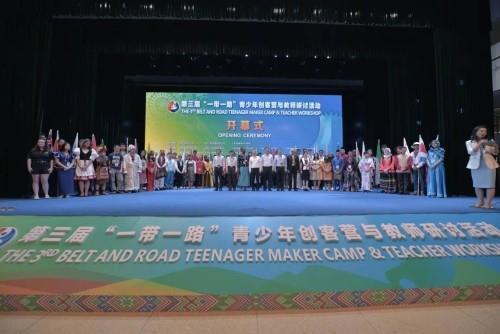Jointly sponsored by the China Association for Science and Technology (CAST), the Ministry of Science and Technology (MOST) and the People's Government of Guangxi Zhuang Autonomous Region, the 3rd Belt and Road Teenager Maker Camp and Teacher Workshop opened in Nanning, capital of Guangxi, on September 25, 2019.

The 3rd Belt and Road Teenager Maker Camp and Teacher Workshop opens in Nanning, capital of Guangxi, on September 25, 2019.
CAST vice president Meng Qinghai attended the opening ceremony together with leaders of other sponsors and relevant international organizations including Huang Junhua, vice chairman of the People's Government of Guangxi Zhuang Autonomous Region; Liu Depei, co-president of the Interacademy Partnership (IAP), co-chair of the IAP for Health, member and former president of the Chinese Academy of Engineering (CAE); Wu Yueliang, member of the Chinese Academy of Sciences (CAS) and vice president of the CAS University; Zhao Jing, vice director general of the Department of International Cooperation, MOST; Manzoor Hussain Soomro, president of the Eco Science Foundation; and Jacqueline Alice Akinyi Olang, executive director of Network of African Science Academies.
Also attending the opening ceremony were representatives of the event's supporters including the CAST Children and Youth Science Center, the Guangxi Association for Science and Technology, the Guangxi Department of Science and Technology, the Guangxi Department of Education, and the government of Nanning as well as envoys of the consulates of Malaysia, Thailand, Laos and Myanmar in Nanning.
In his speech, Meng hailed science as the source power for the progress of the world and innovative talents as the core for science.
He pointed out a key mission of science education is to strengthen international exchanges and cooperation and jointly improve the science literacy of teenagers and foster reserve talents for innovation.
"CAST upholds openness and collaboration and is willing to engage in international exchanges and cooperation with all countries and to promote the sharing of resources and information, the exchanges of talents as well as pragmatic cooperation among countries and regions along the Belt and Road," Meng said, calling for more people to work toward sustainable and high-quality science education along the Belt and Road.
Huang Junhua encouraged participants to share ideas, innovate and explore methods and paths for science education, and promote exchanges and sharing of the science education achievements of countries along the Belt and Road during the event.
A representative of an international organization said at the opening ceremony that the event enabled participants to experience what science really is.
How science can help achieve the sustainable development goals concerns the whole world and no one and no country should be left out, and this is also the essential idea of the Belt and Road Initiative, he noted.
After the opening ceremony, Meng held talks with representatives of the member organizations of the Belt and Road International Science Education Coordination Committee. Under their witness, the CAST Children and Youth Science Center signed an MOU for cooperation with the Tunisian Association for the Future of Science and Technology and the Academy of Engineering and Technology of the Developing World.
Wu Xiangping, member of CAS and research fellow of the CAS National Astronomical Observatories, delivered a report to teenagers participating in the event.
Themed "Openness, Exchanges, Innovation, Development," the event followed the spirit of the Second Belt and Road Forum for International Cooperation and attracted some 300 teenager makers, science teachers, as well as representatives of government education agencies and science education organizations of 37 countries, regions and international organizations in Asia, Europe, Africa, America and Oceania.
To facilitate exchanges and sharing of the science education achievements of Belt and Road countries and regions, the event invited science education experts from the Junior Academy of Sciences of Ukraine and China to open a STEAM course and invited Chinese and Australian science education experts to open a teacher workshop.
The Junior Academy of Sciences of Ukraine and the Tunisian Association for the Future of Science and Technology also introduced their special awards this year at the event for the first time.
This year also marked the first time the event was held outside Beijing. Its host city Nanning is an important hub along the Maritime Silk Road and enjoys unique geographical advantages in implementing the Belt and Road Initiative as it is at the forefront of China's opening up to the ASEAN.
In addition to the science courses, teenagers and science teachers were also organized to watch cultural performances, visit the Anthropology Museum of Guangxi and attend a Night of Cultural Exchange activity to learn about China's harmonious ethnic convergence and promote exchanges, mutual learning and convergence among cultures of different countries.
From: China Association for Science and Technology